Driving in Greece is a great way to explore the country. This article includes driving laws, road rules and tips that will help you survive if you are planning to drive in Greece.
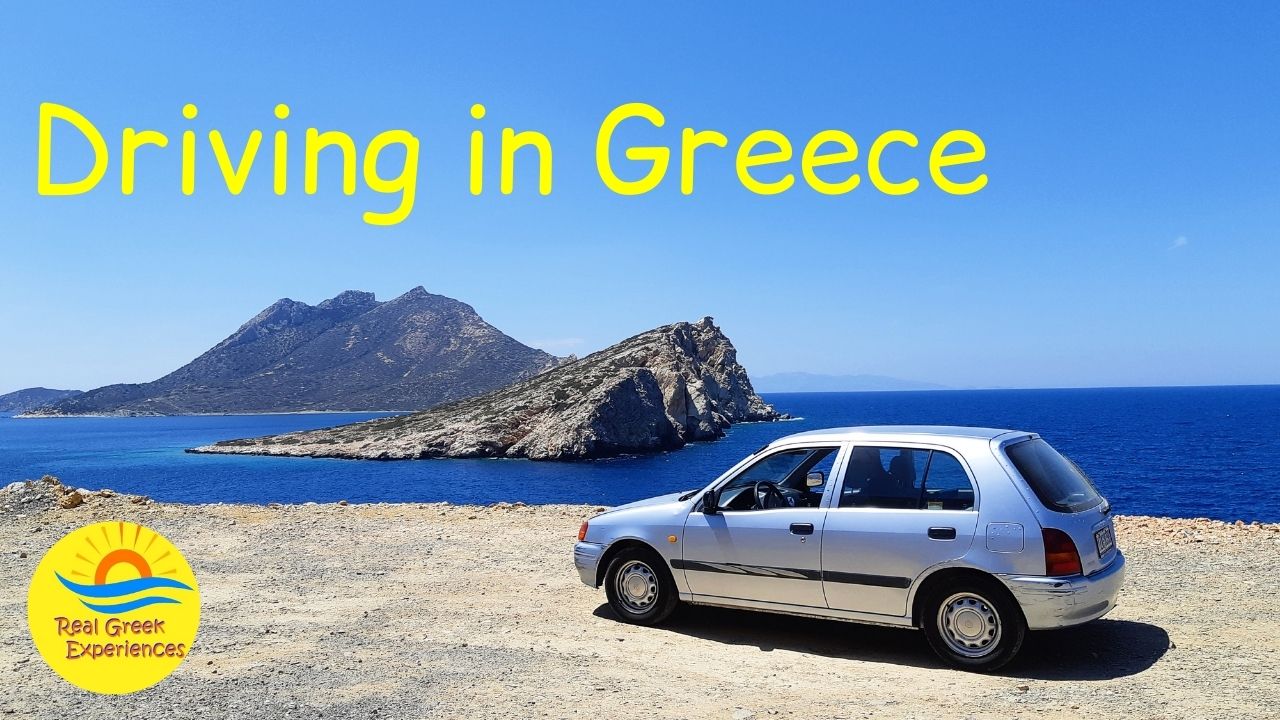
What you need to know to drive in Greece
If you want to get off the beaten track in Greece, the best way is to hire a car and drive yourself! This way you will be able to stop wherever you want, and experience small villages and places that you wouldn’t be able to reach on public transport.
You may have heard, however, that driving in Greece is dangerous, or that Greeks drive like crazy, and you should avoid it if you can. So? What should you do?
This guide to driving in Greece will lay out the basic rules of the road, and help you decide. Written by a local (Vanessa) and an expat (Dave), it offers both of our perspectives on traffic laws, parking rules, car horns and Greek drivers!
We’ve driven A LOT all around Greece in our old and trusted Toyota Starlet, pictured below. This includes much of the mainland, and about 50 of the Greek islands. Here is what you need to know to drive in Greece.
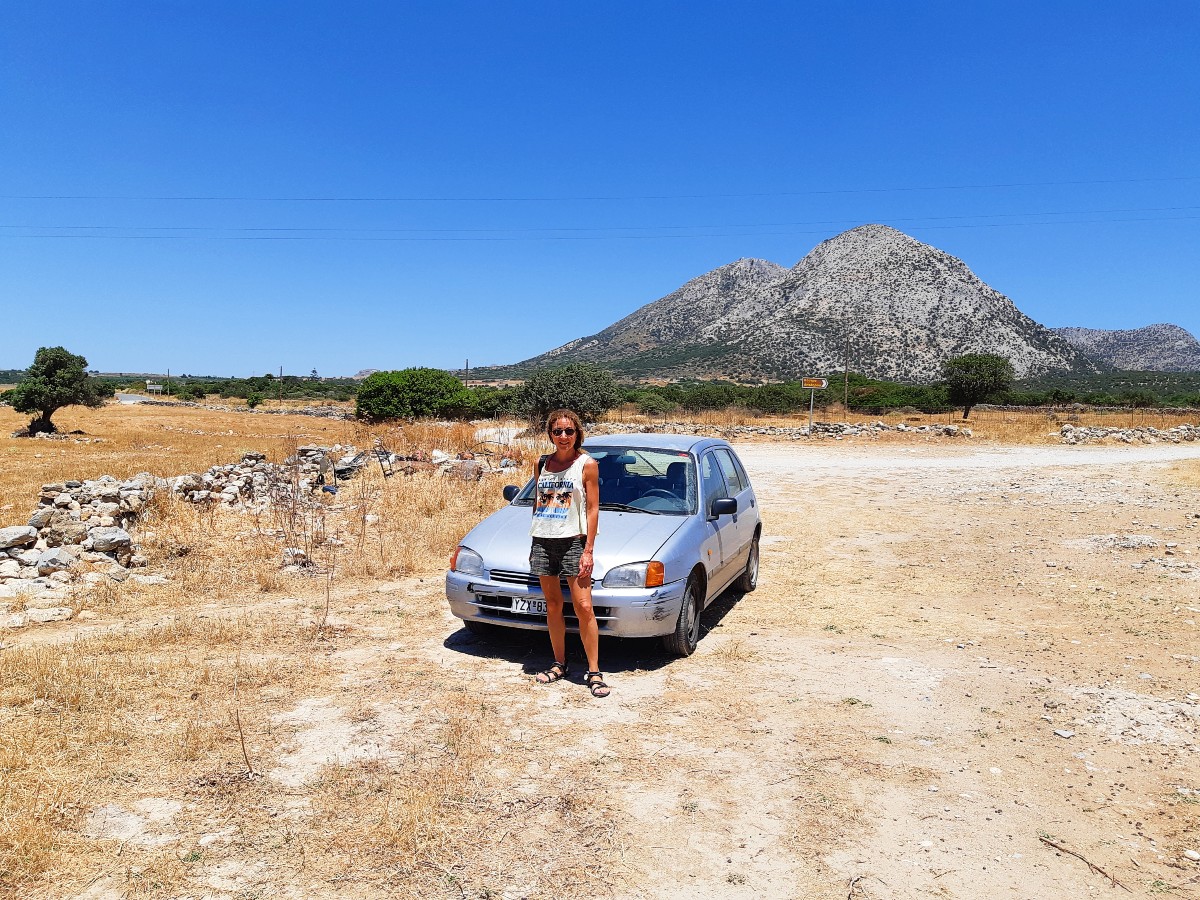
Do Greek drivers really drive like crazy?
When it comes to whether other drivers in Greece drive like crazy, you will probably get different answers, depending on who you ask.
Vanessa: I was born in Athens, and my memories go back to times when no one would wear seat belts, and the Athens metro system only had one line. I am pretty used to the Greek roads and Greek driving style, including the thousands of motorbikes speeding around Athens.

Dave, who is from the UK, has cycled and driven in many European and non-European countries. He has definitely formed an opinion about his fellow drivers in Greece.
To sum our thoughts up, we would say that no, Greeks don’t drive like crazy. However, they are not the most considerate or law-abiding drivers. You will need to pay full attention when driving in Greece.
Driving laws in Greece
If you are planning to drive a vehicle in Greece, you should be familiar with the Greek driving laws. Generally speaking, the Greek law is similar to the law of any EU country.
Here are some key regulations that you should be familiar with if you are planning to drive a car in Greece:
1. Greeks drive on the right hand side of the road
Greeks drive on the right hand side of the road. The vehicles have the steering wheel on the left.
If you have never driven on this side of the road before, allow for some time to get used to it. It’s best to avoid a long itinerary on your first day in Greece, especially if you are jetlagged.
2. Greek drivers don’t always respect a red traffic light
Like in most countries, Greek traffic lights have three colours: red, yellow (orange) and green. Pedestrian traffic lights only have red and green. In a couple of places in central Athens, Syntagma Square and close to Hadrian’s Arch, they even have a countdown timer.
As you will soon realize, it’s not uncommon for local drivers to go through with a yellow, or even a red light. When this happens, it’s also very common for other drivers to use a bunch of Greek swear words and gestures.

Even though fines are very high (700 euro for crossing a red light), you may occasionally see this happen, especially in Athens and Thessaloniki. Obviously, you should avoid doing the same by all means.
At the same time, if you are in the first car at the traffic light, waiting for it to turn green, don’t assume that it’s fine to go immediately. Check right and left before you put your foot on the accelerator, as the driver on the other side might have just crossed a red light.
Many areas of Greece, including the Greek islands, have no traffic lights at all. Pay attention to the signs at any crossroads, and when in doubt just let the locals go first.
3. Cars in Greece won’t always at pedestrian crossings
As a rule, drivers in Greece DO NOT STOP for pedestrians to cross the zebra crossings – we are always surprised when they do. We can’t stress this enough.
If, when driving, you stop for a pedestrian to cross the street, you might be risking a bump at your rear. This isn’t meant to put you off stopping for pedestrians, but make sure you slow down gradually.
In bigger cities, this may actually include traffic lights, especially when there is a right or left turn. You will often see that there will be a yellow flashing light for the driver, and a green light for the pedestrian.
In theory, this gives priority to the pedestrian, but in practice many drivers won’t stop and the car will go through first. If you are the pedestrian, it is probably best to wait patiently.

On a related note, jay walking is supposed to be illegal, but this is only in theory. Plus, sometimes, it’s the only way to cross a street as a pedestrian. Just be mindful of any cars or scooters.
Verdict: If you are the driver, slow down gradually. If you are the pedestrian, never assume that car drivers will stop for you. If they do, make sure they have fully stopped before you attempt to cross the street, and double check for any scooters hidden behind the car.
4. Road signs in Greece might be in Greek
Road signs in Greece look different to signs you may have seen in other countries. Very often, names are in two languages, Greek and English.

But, here’s the catch: Sometimes, names are only written in Greek, which can be really confusing for visitors.
We suggest that you familiarize yourself with the Greek alphabet, and at least check how your destination is written in Greek.
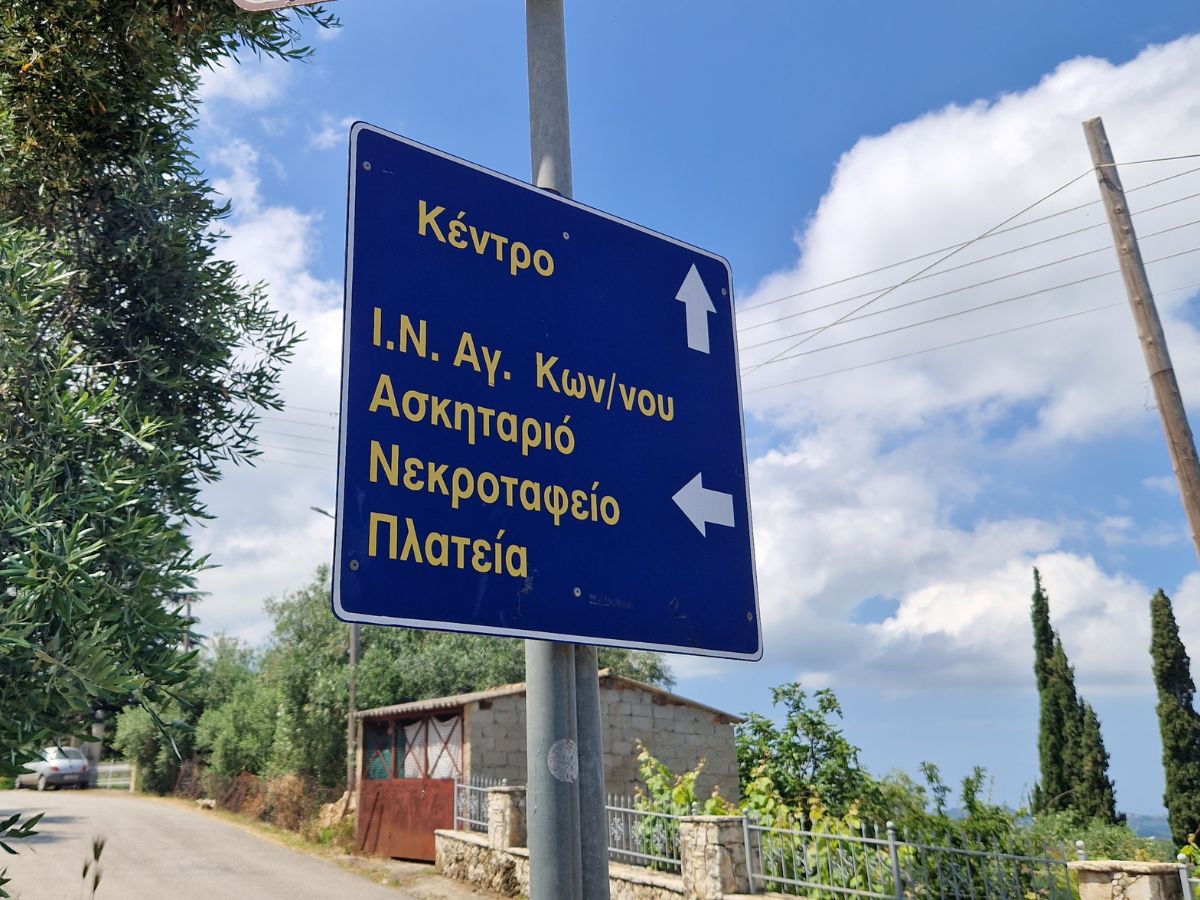
Another issue is that Greek names are sometimes translated into English in a way that you might not be familiar with.
For example, every visitor knows the word “Athens”. However, you may see signs with the word “Athina”, which is, actually, what we call our capital. Similarly, Piraeus port is often written as “Pireas”, which is what we call it in Greek.
Note: While Google Maps is helpful in most cases, it has often sent us the wrong way, especially on some of the smaller islands where we’ve been. If you see a sign pointing to the place you want to go, just follow the sign and ignore Google Maps. More on this, later.
5. Vehicles coming from the right always have priority
The following road rule is perhaps the most confusing for visitors – please read carefully!
By default, vehicles coming from the right always have priority in Greece, unless there is a traffic light or a sign indicating otherwise. Confusingly, this also applies for roundabouts and traffic circles.
The traffic entering the roundabout has priority, unless they have an octagonal Stop or a “red-and-yellow upside triangle” warning sign, like the one in the picture below:

Once you are in the roundabout and want to exit, turn your right indicator on, and move swiftly towards the exit. It might feel scary at first, but you will get used to it. Hopefully.
If the cars entering the roundabout to your right have the octagonal Stop sign, or the upside-down triangle sign, you can easily identify it just looking at the back. Therefore, you will know that they need to stop and let you go first – which is often easier said than done.
As you are inside the roundabout, you will need to be extra careful and spot any signs for the other car. However, that doesn’t mean that the other car will actually stop if they have a sign!
And while none of this makes any sense, roundabouts are pretty common in Greece, even on the highways! So, you’ll have to get used to all of this very quickly if you want to drive in Greece!

Driving on the highways in Greece – Speed limits
In the past couple of decades, many of the highways in Greece have been rebuilt to very high standards. They are brand new, modern and safe.
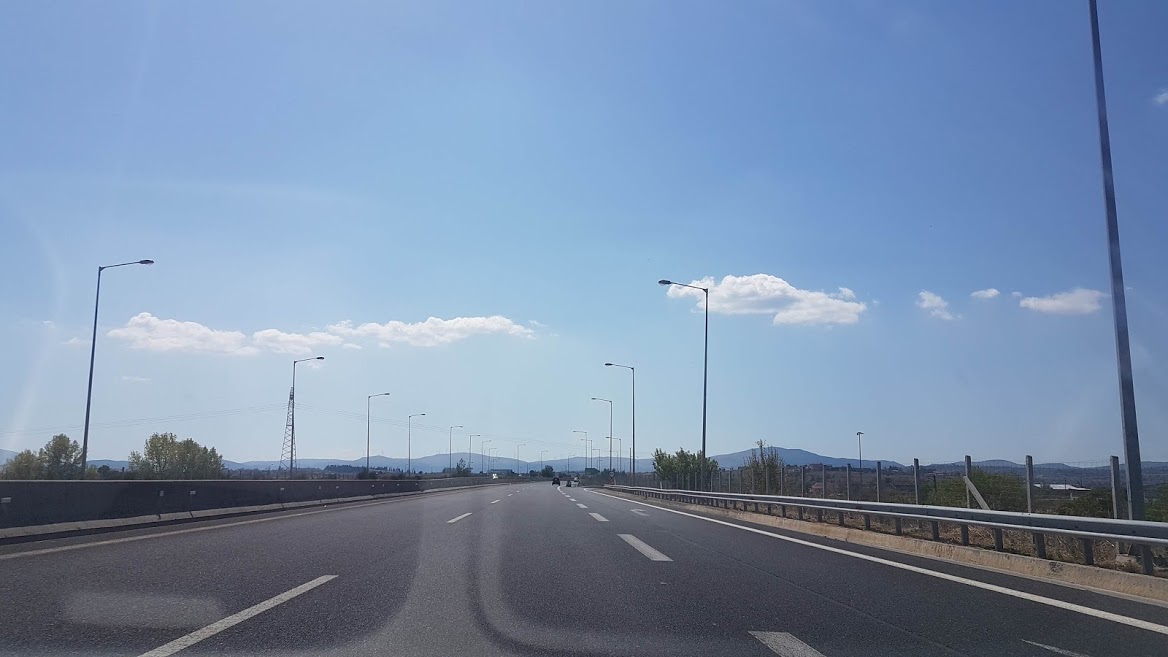
By law, maximum speed on the highways is 130 km/hour, though many of the signs you will see show a speed limit of 120 km/h.
In practice, you will very rarely have any issues with the Greek police if you go slightly over the speed limit. That said, we recommend that you stick to the legal speed as shown on the signs.
Most of these amazing highways were constructed by a bunch of private companies. And here is the catch – they have tolls, which can be quite substantial.
Tolls on the highways in Greece
Tolls on the highways in Greece are not negligible. Αs an example, the tolls from Athens to Thessaloniki cost just under 34 euro, and the tolls from Athens to Kalamata cost about 18 euro.
The benefit of the high tolls is that you might find no traffic at all on the highways, especially if you are driving off-season or on weekdays. National holidays and weekends are an obvious exception.
You can pay the tolls by either card or cash. Many of the toll booths are reserved for pass holders, who are making use of the fast pass system. Make sure that you go to the booth with the blue man.
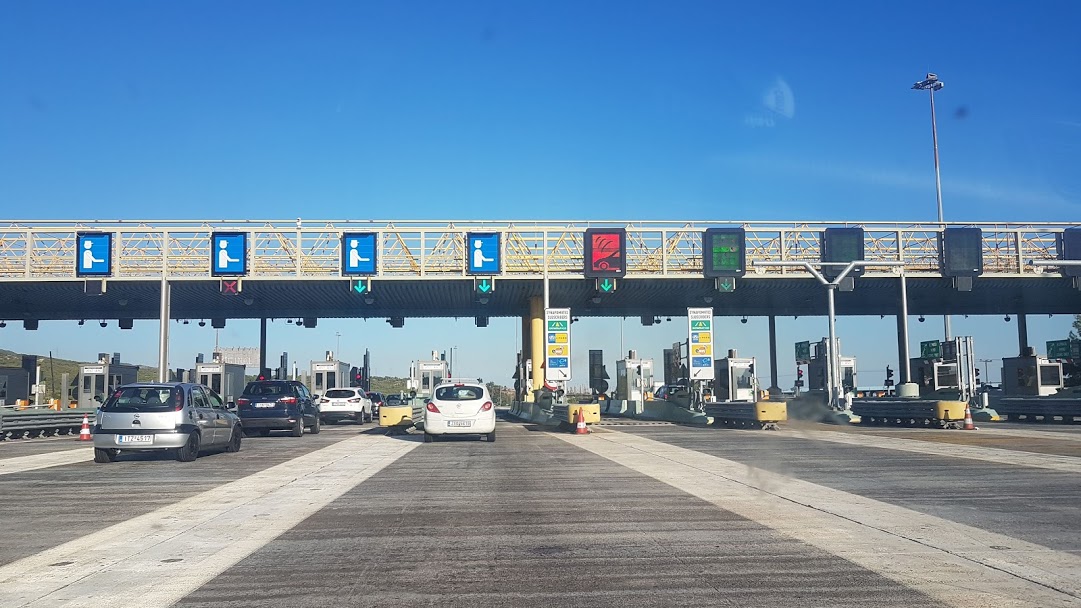
What many visitors (and also Greeks) find annoying, is that there are many toll booths along the way. The only thing you can do? Be patient, or avoid the main highways and opt for the secondary national roads.
Driving on the national roads in Greece
Alongside the main highways, Greece has an extensive network of national roads. These minor roads connect different areas of the country or the smaller towns.

If you want to avoid toll roads on your road trip, national roads can be an interesting alternative. You can see more of the country, and pass by scenic towns and villages.
Before you decide to venture out on the national roads, you should know that they can be hit and miss. Some of them might be freshly paved, but some others may be in serious need of repairs.
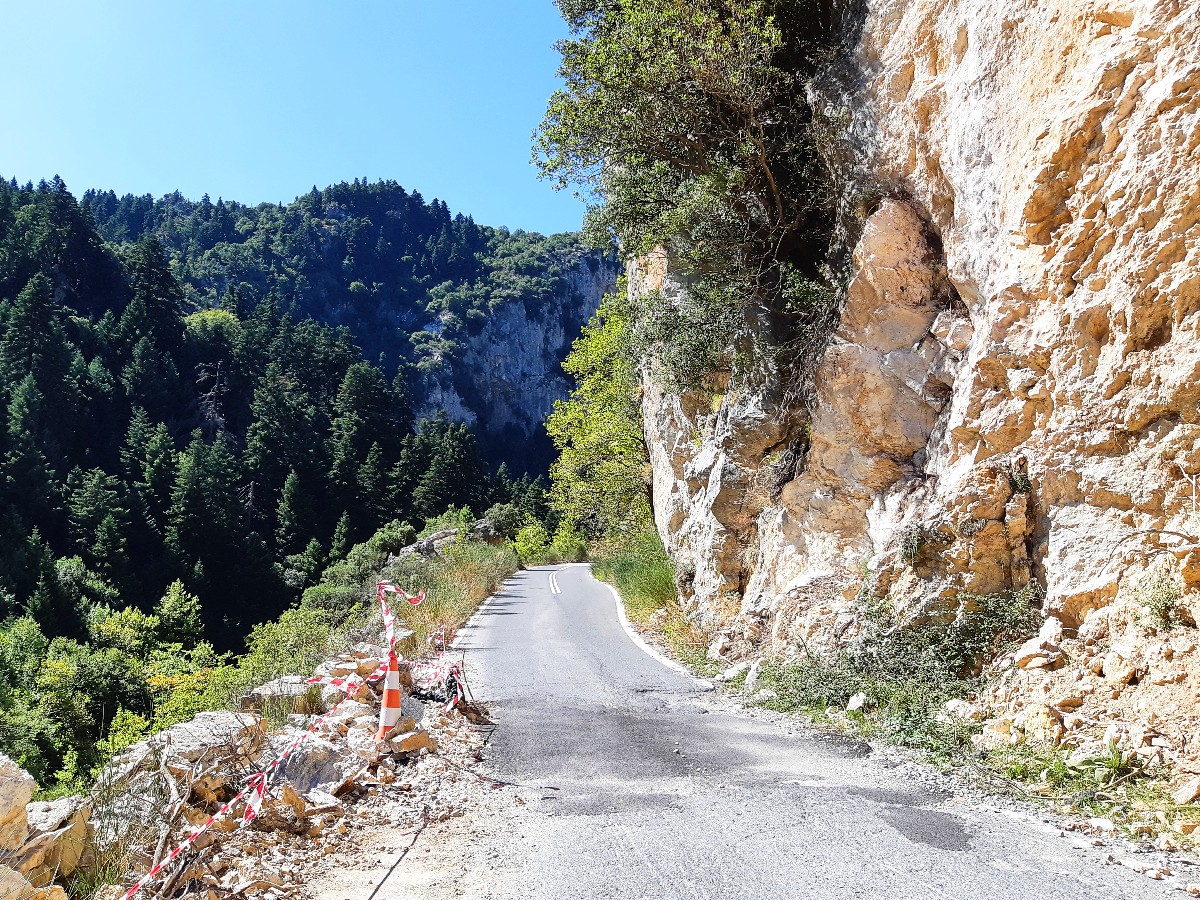
If you are driving at night, don’t expect these roads to be well-lit, or even lit at all. Make sure your front lights are good, or just avoid driving at night if you aren’t feeling confident.
The speed limits on national roads generally vary from 90 το 110 km/h, but you should always pay attention to the red-and-white speed limit signs. If you are passing through a town or village, the speed limit is 50 km/h, unless otherwise stated.
Driving on the Greek islands and rural areas
This is where it all becomes fun – or scary, depending on what you are used to!
The roads on the islands and rural areas in Greece are in stark contrast with the modern, wide highways. Be prepared for driving on cliff sides, steep inclines, sharp turns, narrow roads, and many, many dirt roads.

When driving in rural areas, you may come across cows, goats, sheep, donkeys, chicken, snakes, lizards, turtles, and foxes. These are all animals we’ve come across while driving on the islands. You are also likely to meet some stray Greek cats and dogs.
On many mountain roads, there are often blind spots due to the very tight turns. It’s a good idea to beep your car horn softly, as a warning to any oncoming traffic.
If you are stuck behind a tractor, track or bus on a mountain road, make sure that there’s a long stretch of road ahead if you try to overtake them. Otherwise, accept that you might need to drive behind them for a while.
Overall, it’s best to drive slowly, and enjoy the views!
Driving in Athens and other Greek cities
Driving in the urban areas in Greece can be a challenge for visitors, and we would advise against it. Athens and Thessaloniki in particular can get quite crazy in terms of traffic, especially on days when public transportation is on strike.
Apart from cars, vans, buses and trolleys, there are a number of two-wheeled vehicles such as motorbikes, motorcycles, scooters, vespas and mopeds. All of these often go in between car lanes, without any notice.
In an attempt to reduce congestion, Athens has a system where car access is restricted in certain areas, known as daktylios. This is based on whether the car’s Greek license plates end in an odd or even number. Fortunately, rental cars are excluded from this system.

While in Athens, it’s usually best to walk, use the Athens metro / Athens airport metro, or a taxi – but beware of taxi scams. Here are all the ways how you can get around Athens Greece.
If you are visiting Thessaloniki, much of the city is walkable. You can also use the bus network, which is much less complex than the network in Athens.
If you are planning to rent a car in Athens, consider renting it from the Athens International Airport. Some companies in Athens can actually get one of their employees to drive you out of the city center, so ask if this is an option.
Google Maps in Greece
Google Maps generally work fine while driving in Greece. If you have an unlocked smartphone, you can get a Greek SIM card, and use Google Maps for the duration of your trip.
However, when driving on the islands, remember that a dirt road and a paved road don’t look all that different on your mobile phone’s screen. And, sometimes, Google Maps will ask you to take a minor road, which is not only in terrible condition, but also very narrow.
As mentioned earlier, if you see a road sign for the place you are heading to, ignore Google Maps and follow the sign. In our experience, that road is always better.

If you ever find yourself on a dirt road, make sure your car rental agreement covers you for this. Generally speaking, normal cars are not covered on dirt roads – which means that, in case of an accident on a dirt road, your insurance will be void.
We’ve damaged our own car a couple of times due to some bad potholes that weren’t visible so we are talking from experience – better safe than sorry!
Use of mobile phones while driving
By law, using a mobile phone in Greece is only allowed if a Bluetooth device is used, or in speaker mode, provided that the phone is placed in a special phone holder in the car.
In the absence of this, if you are using your mobile phone to read Google Maps, just leave it on the seat, or give it to the person sitting next to you.
Holding your phone or using normal (as opposed to wireless) headphones while on hands-free mode is strictly prohibited. The fine for this is 100 euro, plus the police can take your license away for 60 days – which will definitely ruin your vacation.
We do have friends who got fines for speaking on their mobiles while driving, so I’m sure it can happen to anyone.
Parking a rental car in Greece
Parking is something you should consider carefully when driving in Greece, as it varies a lot throughout the country.
Generally speaking, street parking is allowed in Greece. In theory, there are several exceptions – for example, you will need to be at least 12 meters away from a bus stop, 5 meters from a fire hydrant and 20 meters from a traffic light. In practice, these are rarely enforced.
If you decide to drive in the bigger cities, be aware that parking might be regulated in certain areas, or you may have to pay a small fee. Ask around for the latest information, as things tend to change now and then.
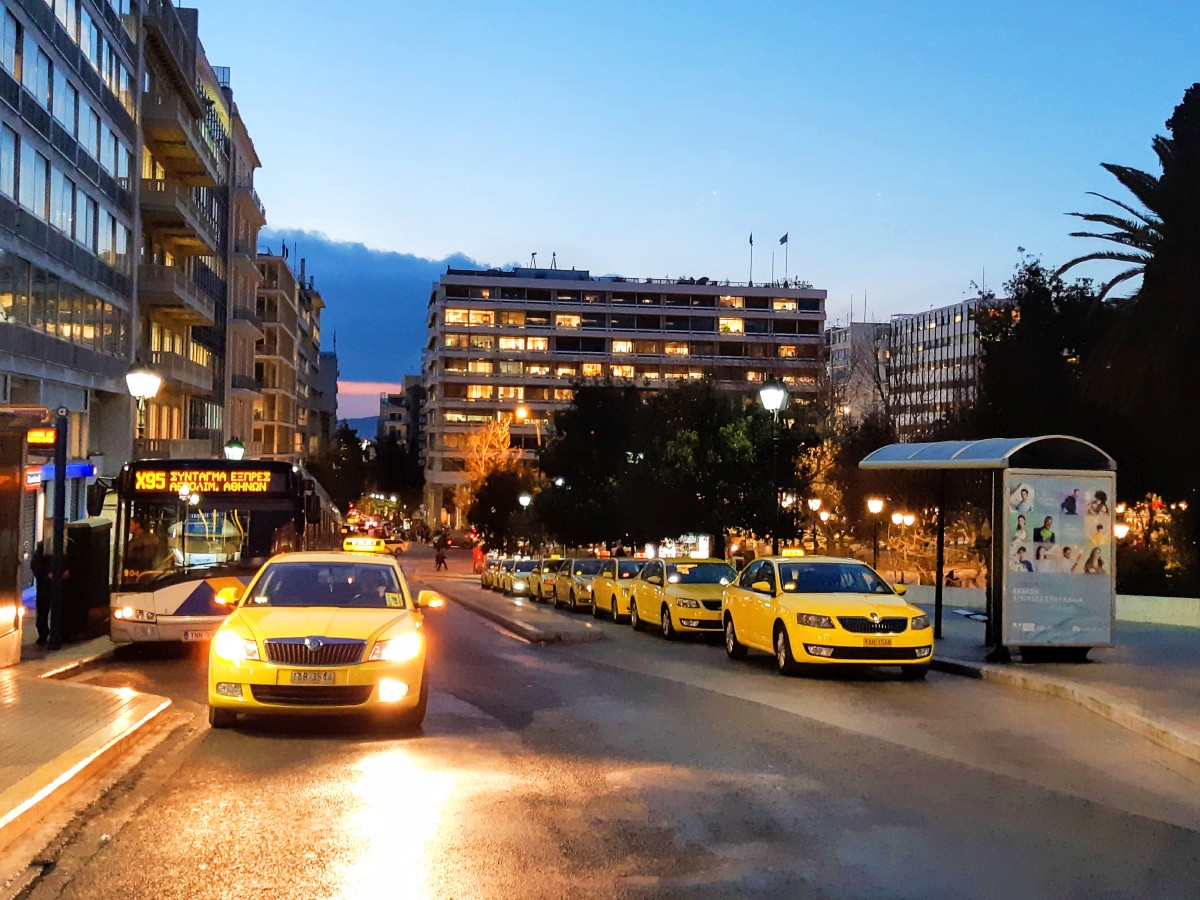
In smaller towns and villages, there are usually designated parking areas, often outside the village. If you are staying in one of those villages with a hired car, ask your hotel owner for more details.
DO NOT park under “No parking” signs, even if local drivers are parked there. Chances are that you’ll never get a ticket, but we have seen it happen a few times in several areas in Greece, including Athens, Naxos, Rhodes and Thessaloniki.
Many archaeological sites around Greece have their own parking space. Athens is an exception, and you would be mad if you wanted to get to the Acropolis, the Ancient Agora or any of the other ancient sites in Athens in a rental car.
Parking in the Greek cities
Parking on residential streets is generally allowed in most Greek cities. Pedestrianized areas, such as the historic center in Athens, are usually closed to the traffic.
Finding a parking spot can be a challenge, especially in the bigger cities like Athens and Thessaloniki. An exception is August, when many locals leave for their holidays.
Other popular cities with huge parking problems are Chania and Heraklion in Crete. Getting a parking spot in the centre of Chania in August is next to impossible.
As mentioned earlier, it’s best to avoid driving into the bigger cities, and exploring on foot instead. If you must have a car in the cities, try and book hotels or apartments with private parking space, wherever possible.
When it comes to parking, don’t do like the Greeks!
With all that in mind, you will be surprised at the creativity, not to mention the nerve, of locals when it comes to parking spaces.

You are likely to see vehicles parked literally everywhere – on the pavement, at a street corner, right underneath a “no parking” sign. You will often see cars with the hazard lights on, having stopped right in the middle of the street.
Again, we suggest that you avoid doing what the locals do. Parking fines can be hefty, and they can be very confusing to deal with, as the parking ticket will be in Greek. Paying a fine may be a long process. So, make sure that you are parked legally.
I still have no idea how the people in the photo below got away with this 🙂
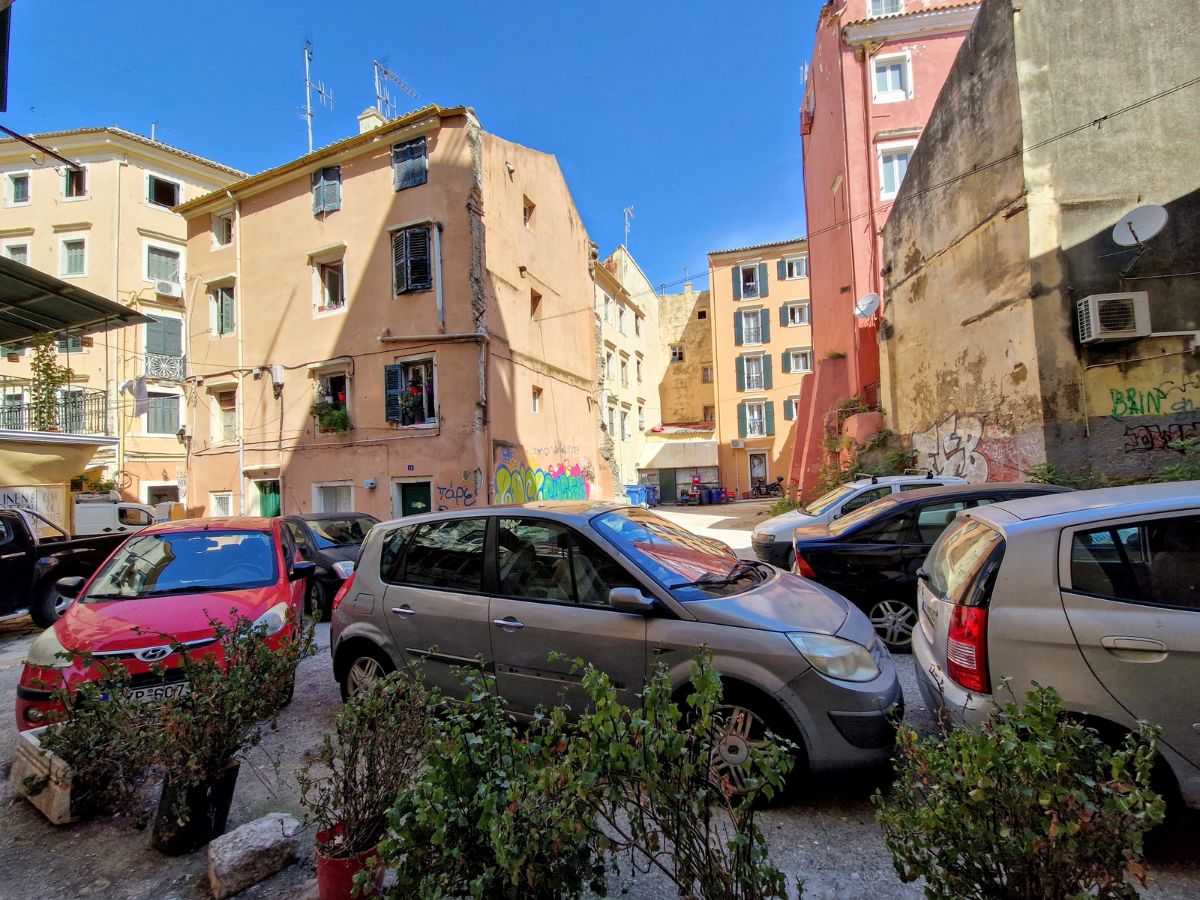
What to expect when you drive in Greece
Here are some examples of driving behavior that are common in Greece – but you should avoid:
- Changing lanes on a main road or three-lane highway without using the indicators
- Going the opposite direction on a one-way street
- Going in reverse for a long distance
- Speeding up, rather than slowing down, when the traffic light turns orange
- Beeping at the car in front as soon as the light turns green
- Ignoring the STOP signs, or any other road signs
- Using your mobile phone while driving
- Going over the legal speed limit
- Parking on the pavement, a zebra crossing, an intersection, right under a bus stop
- Stopping in the middle of the street, even on a main road, without any warning. An example is when people stop to buy something from a shop or a kiosk.
While all of the above are illegal, you might see one or more of these things happening while driving in Greece.

All in all, if you are new to driving in Greece, it’s best to drive defensively. In case of doubt, just let the locals do whatever it is they are doing and maybe try to avoid confrontation.
For an insight into why driving rules in Greece are only taken as guidelines by the locals, check this tongue-in-cheek post on Greek customs and Habits 🙂
Do I need an International Driving Permit (IDP) for Greece?
It depends on the country that has issued your actual driver’s license.
For example, visitors who have a valid license from an EU country do not need an IDP to drive in Greece. This extends to Switzerland, Norway, Lichtenstein and Iceland, as long as the information is written in English.
As of 5 November 2021, visitors with a valid driving license from the USA, Canada, Australia, UK and Gibraltar, no longer need an IDP to drive in Greece, as long as their national license is in English. The same happens for other countries that have signed the Vienna Convention (if you’ve never heard of this, click here).
STILL, some car rental agencies might ask for an IDP, and not let you rent a car unless you have it with you. In a way, it doesn’t hurt to get it before your trip to Greece, especially if you are planning to hire cars in many destinations.
Here is my full guide: Can you drive in Greece with US license?
Hiring a car in Greece
As we have our own car, we have used rental cars in Greece only a few times.
This was when it was cheaper to fly to an island and rent a car for a day or two, rather than bring our own car on the ferry from Piraeus. As we travel for a few weeks at a time, bringing our own car is more convenient for us.

In order to hire a car in Greece you will need to have a valid driver’s license, obtained at least a year ago. You will also need to be over 21 years old, or maybe older, depending on the company’s insurance policy.
Some companies might also have an upper age limit, so you should check it out before you proceed to booking a vehicle.
In general, we suggest that you read each company’s policy very carefully before renting a car in Greece, including the fine print.
All major companies accept credit cards, and they will usually require one to secure your booking. Depending on the company, the company might keep a certain amount from your card, and return it when you return the car.
Discover Cars is an online platform where you can see all the T&Cs in advance of your trip, and book a vehicle before you begin your vacation. They offer very competitive prices, and you can always be sure that you’ll have a car waiting for you at your destination.
Car rental options in Greece
Stick shift cars are the norm in Greece. You will find a range of various makes and models, which differ in size and power. Automatic cars might be available upon request, though your options will probably be limited.
All in all, choose a model that you feel comfortable driving. Always remember that a bigger car is more difficult to navigate around the narrow island roads – more on this below.
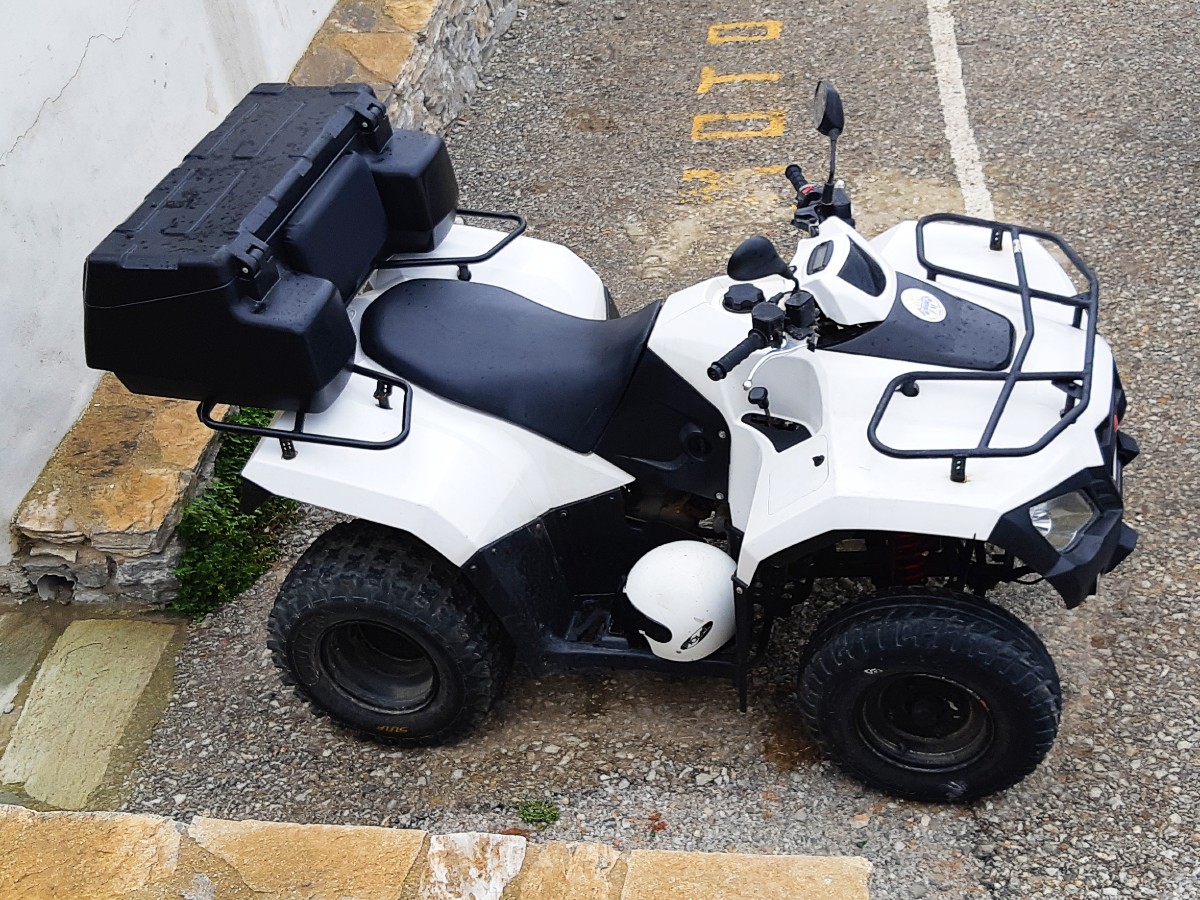
Apart from regular cars, you will typically find options like 4WDs, ATVs / quads and various types of scooters and motorbikes. Quads are popular, but take your time to get used to them.
If you are planning to drive on dirt roads, make sure you rent an appropriate vehicle, like a 4WD. Otherwise, if you run into trouble, the insurance will be void and you will be charged.
We actually damaged our own car when driving around some bad dirt roads on Milos island. Not a serious accident though – it was easy to repair.
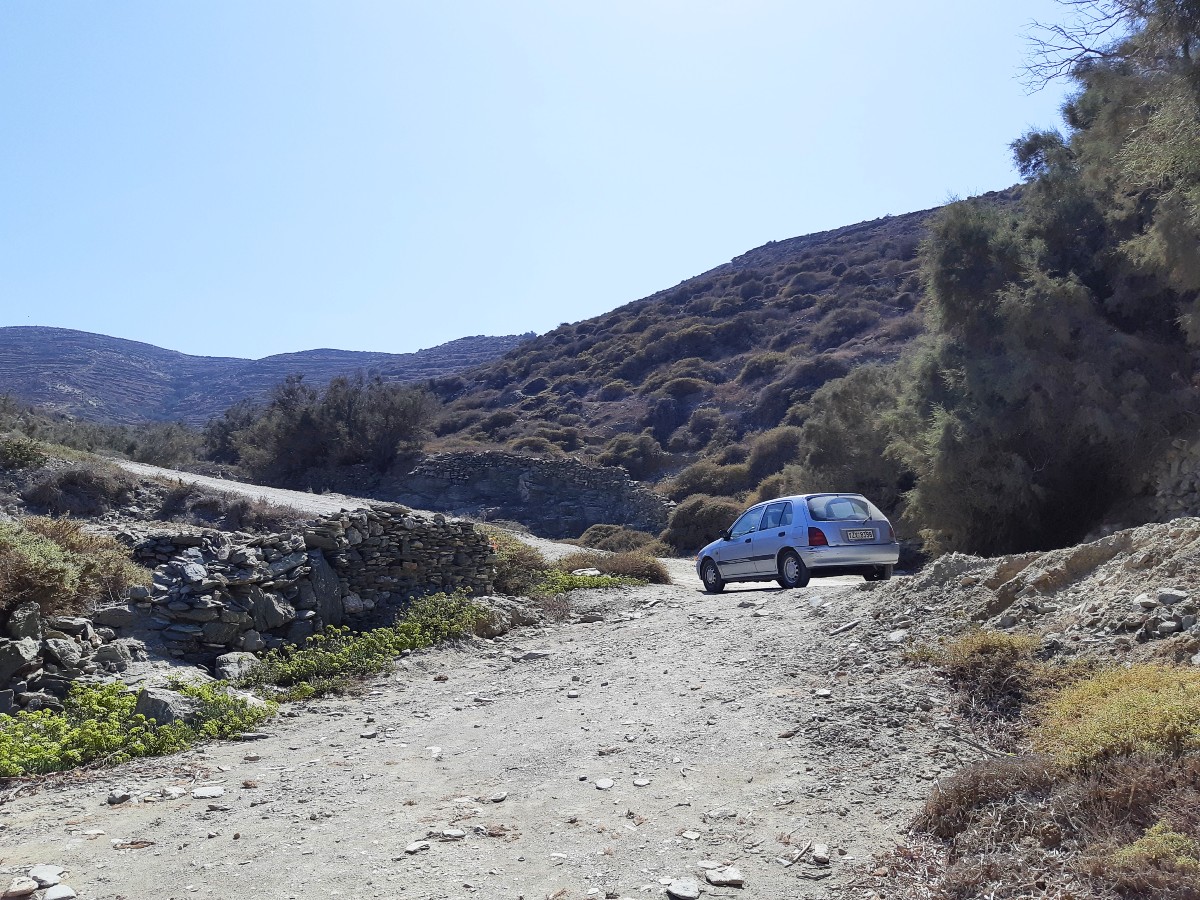
Finally, if you are coming to Greece in winter and planning to drive in mountainous areas, you should have snow chains with you. These are required by law, so make sure your car rental company can provide them.
How much does a car hire cost on the Greek islands?
The cost of renting a car generally depends on the island, time of year, type of car and number of days you want it for. You should expect to pay about 40-50 euro a day if you are travelling in summer.
Hiring a car in Greece with children
According to Greek laws, children up to 12 years old should use a suitable child restraint. This should be placed in the back seat rather than the front seat.
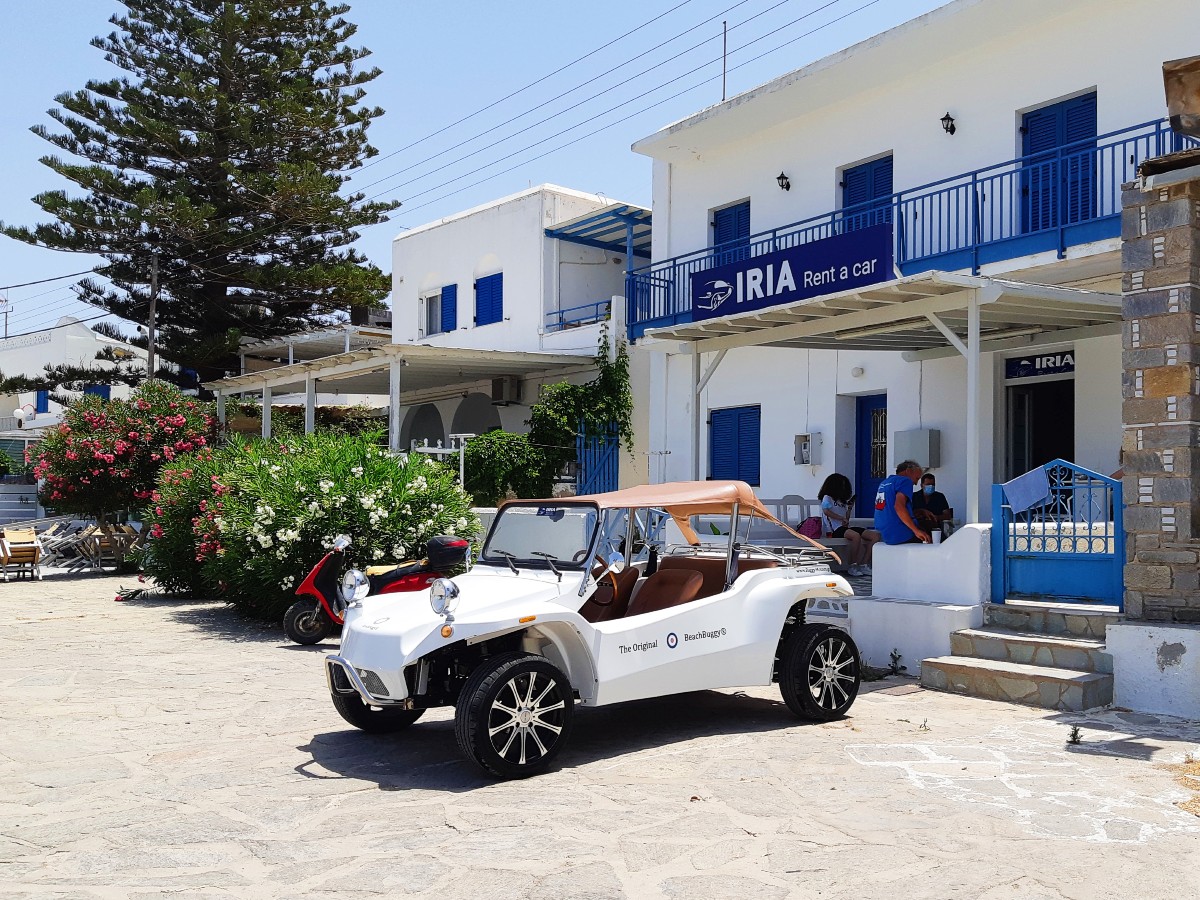
This might not make sense for some children, as children’s seats are designed up to a weight of 36kg / a height of 135cm. So if your child is under 12 years old and over those limits, check with the rental company.
Make sure you reserve the appropriate child restraint at the time of booking, as otherwise you may not be able to find one.
Gas stations in Greece
Before you set off on a road trip, you’ll need to fill up with fuel. You will notice some providers that you will be familiar with, such as Shell or BP, and some others that you have never seen before, like Aegean.
Once you arrive at the gas station, there will be an employee who will fill up your vehicle. Sometimes, you’ll need to go inside the store if you want to pay by card.
If you are taking a vehicle to remote areas, make sure you’ve filled up in advance of your trip. Some of the smaller islands, like the off-the-beaten-track Donoussa, don’t even have a gas station!
Drinking and driving Greece – Driving alcohol limit Greece
The legal drink / driving limit in Greece is 0.50 gr of alcohol per liter of blood. In practice, this is no more than a large glass beer for men, and a bit less for women.
Note that the limit for the blood alcohol content in Greece is lower than the UK (except Scotland), Canada and some US States.
Overall, it’s safer to avoid driving if you’ve had more than one alcoholic drink. And if you are taking a winery tour or other tour which includes drinks, just take a bus or a taxi afterwards.

Note that the legal drinking age in Greece is 18 – though, in all honesty, it’s not as strictly enforced as in many other countries.
Emergency numbers – Roadside assistance
While we hope you won’t need to use any emergency numbers while driving in Greece, it’s always best to have them available.

The European Emergency Number, 112, is a unique number you can contact in all of the EU in case of emergency. Alternative numbers you could use are:
- 100 (police)
- 166 (ambulance service)
- 199 (fire brigade).
Make sure you ask your car rental company for any other numbers you can use in case of emergency.
FAQs about driving in Greece
People planning to rent a car and drive in Greece often ask questions like these:
Is driving in Greece difficult?
Most visitors find that driving on the Greek highways is a breeze. Driving on the islands is fine, once you get used to the narrow streets and street parking. However, driving in the bigger cities like Athens can be a challenge, and it might be best to avoid it.
Can tourists drive in Greece?
Yes, tourists can drive in Greece. Depending on where you are from, you might have to get an International Driver’s License before your trip.
What documents do I need to drive in Greece?
This depends on where you are from. Driving licenses issued by all EU / EEA Member states are valid in Greece. As of November 2021, Australia, Canada, United Kingdom and United States residents no longer need an International Driving Permit to drive in Greece.
Can I drive in Greece after Brexit?
People with a valid driver’s license from the UK can drive in Greece without the need for any further documentation.
Are Greek road signs in English?
Many of the road signs in Greece are in both Greek and English. However, sometimes you will only find signs in Greek.
Is there a drink drive limit in Greece?
The drink – drive limit in Greece is 0.5 gr per litre of blood, or 0.25 mg per litre of breath. This translates roughly to a large glass of beer for men, and less for women who tend to have smaller body weight. When in doubt, don’t drive!
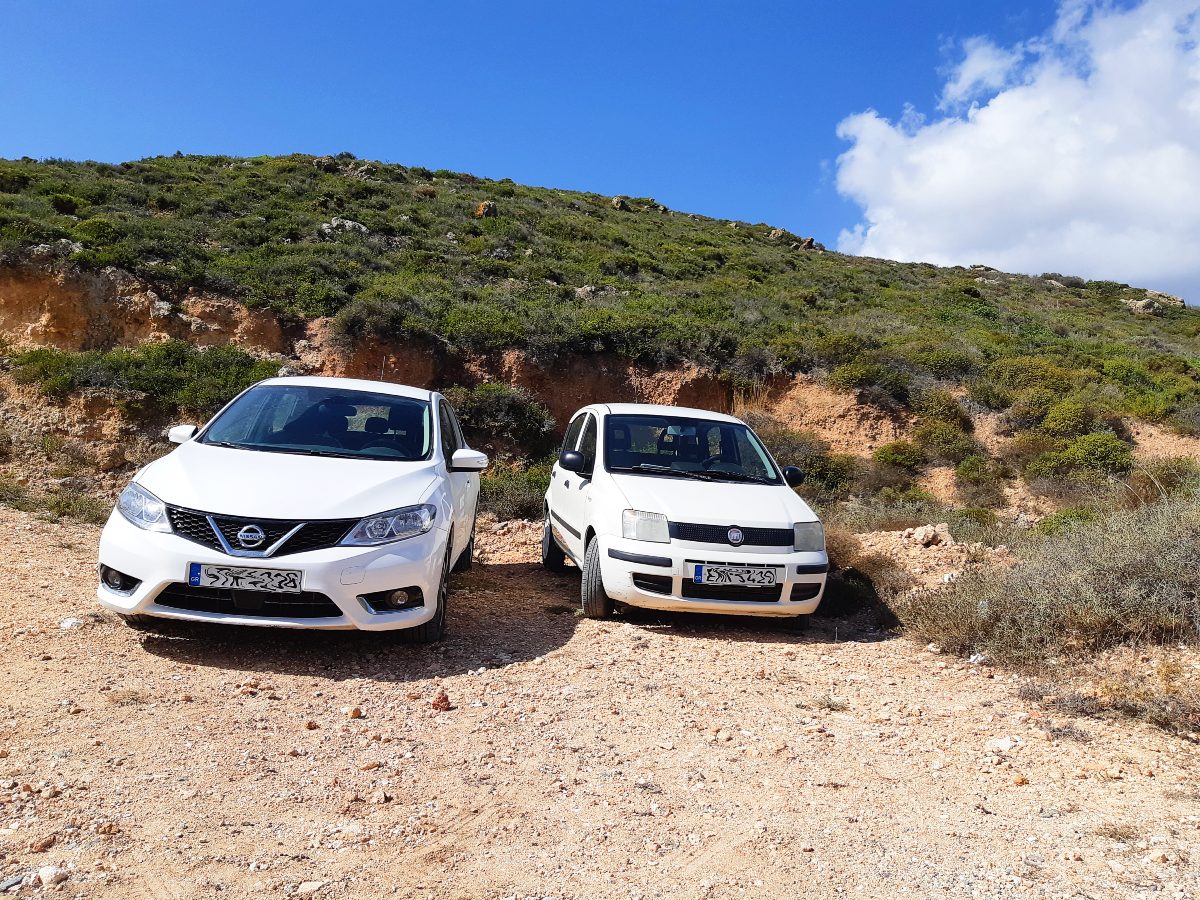
Should I use public transportation instead of driving?
Using public transportation might be more hassle-free, but you’ll have to skip places that you can only reach with a car. Plus, even though transportation strikes in Greece aren’t too frequent, they might affect part of your trip. If you have a valid driver’s license, you should consider renting a car and driving around Greece.
Can I bring my own car to Greece?
Generally speaking, you can bring your own car to Greece. You’ll need to bring the car’s valid registration paperwork, along with proof of internationally valid insurance.
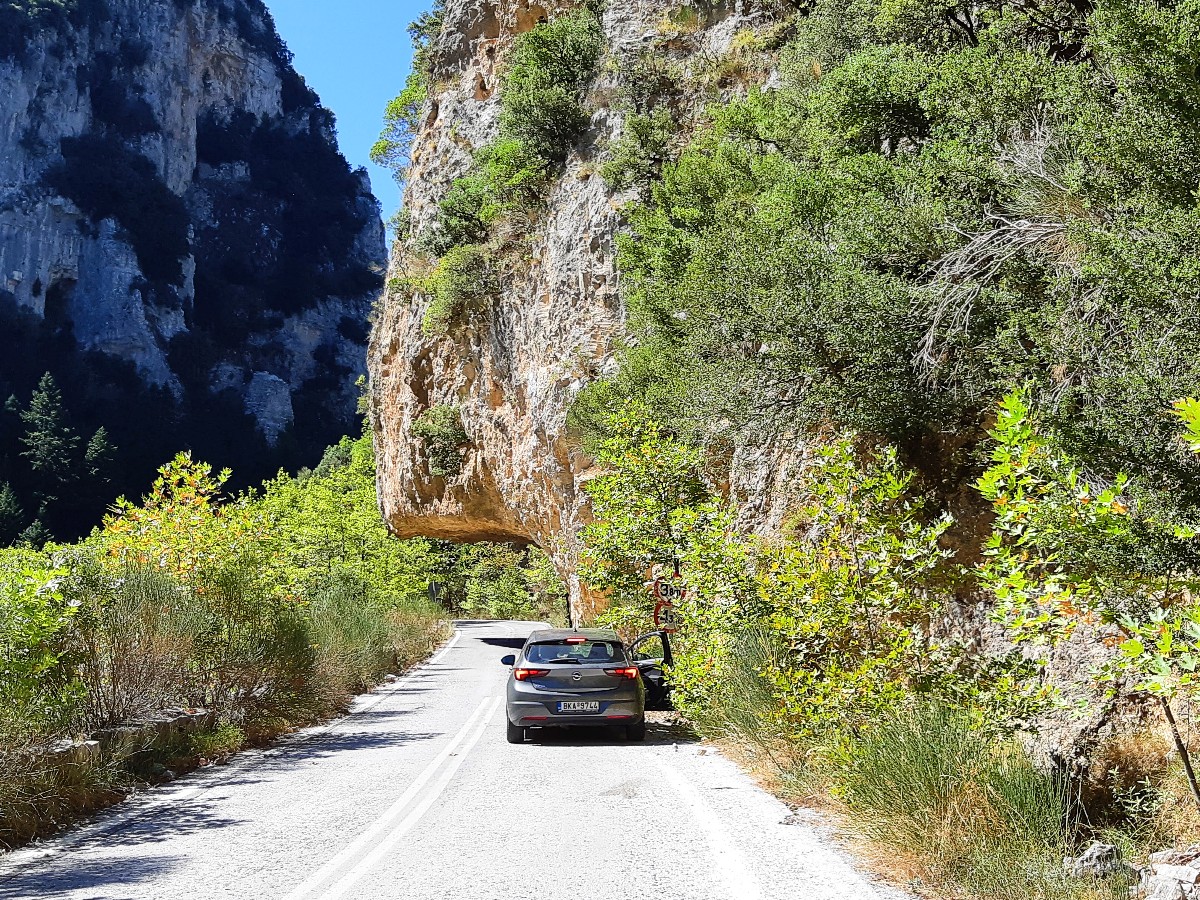
Is driving in Greece safe?
Yes, driving in Greece is safe. However, if you are not used to narrow, winding mountain roads, you might find it challenging. Proceed with caution!
Also, have a look at this guide: Is Santorini safe and things to avoid.
More travel tips for Greece
If you found our article with driving tips for Greece helpful, you will probably like these other ones:
- What to pack for Greece for any season
- How to plan an island-hopping trip in the Cyclades
- How to tip in Greece
- Athens day trips
- How to get around Rhodes
- How to get around Kos
- How to get around Milos
- Useful words and phrases in Greek
- Athens to Thessaloniki by train

Hi! We are Vanessa and Dave, an Athenian and an expat living in Athens. We’ve been on many road trips around Greece, and have driven thousands of kilometres on highways, mountain roads and dirt roads on the islands. Follow us on our social media:
- Facebook page and very active Facebook group
- Amazon


Found this article to be very close to my own experience of driving in Greece 🙂
Still, can’t wrap my head around why cars going in to a roundabout has right of way???
It makes no sense.
You are not alone, most foreigners can’t get this logic either! It makes sense to me as I learnt to drive here, but I can totally feel you!
Thanks for the tips, I’ve driven a lot in Spain and it sounds pretty similar.
I think so, however in Spain they stop at the zebra crossings if I’m right?
This is an excellent article and really helpful, thank you for writing it. My wife and I are thinking of planning a road trip around mainland Greece; we would start at Athens, drive to Olympia, Delphi, Kastraki for Meteora National Park, and finally Litochoro for Mt Olympus before heading back to Athens. Would spend two days in each area, apart from Athens of course! Do you think we’d have any problems doing a trip like this in a hire car? Still need to figure out places to stay and thereby each parking situation. We are two UK drivers with experience driving manual everyday, and auto around the USA.
Thanks for your message – your itinerary sounds great and there would be no issues doing this with a hired car 🙂 If you can fit in Ioannina, it’s a lovely little town worth visiting, but if not, next time, there’s so much to see in that area (Epirus) too! We stayed in Kalambaka where parking was a breeze for the most part (Kastraki might be a little more challenging, depending on where you stay) – we stayed in this apartment, lovely place and super nice people
All the other areas should be fine for parking, I am hoping that you aren’t planning to get around Athens by car though 😀 Enjoy your stay!
Thank you for the great info! We are flying into Athens this October and would like to drive to Meteora. Are there any stops you’d recommend along the way?
A popular stop is actually Ancient Delphi! I also love Ioannina, a small but vibrant city in the region called Epirus. Enjoy your time!
Very helpful info. May I ask is it legal to make a right turn when you have a red light? Some states in the US allow this, and other states do not. Thank you!
Hi, thanks for your question! No, by law it is not legal… but some people would do it anyway!
Thanks for the great information and advice. How’s the drive from Kalambaka to Igoumenitsa port near Corfu? Is it safe for single women to drive? Is there cellular service? Thank you so much.
Hi! This road is fine, I’ve done it some time ago. I’m pretty certain there is cellular service everywhere, but it’s always best to download the offline Google Maps in case signal fades out for a while. Enjoy your time!
I am retired and moving to Greece in 2025. I bought a small car to bring to Greece but I also have a pu truck. I am thinking of bringing my truck instead as I have converted it into a camper. What I want to know is will I be able to get through most streets in Greece. I have been in the housing area roads and they are small but I see those big vans going through. It’s a crew cab 4 x 4 truck. My family lives about 10 miles from the beach area.
Second question: When would I apply for a visa to stay longer so I can find a place to live and try to get some of my paperwork done. Could I do it while I am there for vacation this year or would I wait until I moved there next year? If you can’t answer my questions, could you direct me to someone who could answer my questions about the in’s and outs of moving to Greece.
Thank you
Hi – please join our Facebook group Expats in Greece which is a great source for such information. Regarding your vehicle, I suppose it depends where you will end up living, but overall importing a vehicle to Greece can be very difficult and most people say it’s not worth it. Hope everything goes smoothly for you!
Do you have any information on purchasing a car in Greece.
Hi! Please ask this question in our Expats in Greece group on Facebook.
Hello, very helpful article. We are planning on driving around Crete, and then driving Athens-Nafplio-Olympia-Delphi-Kalampaka-Athens (not driving in Athens) in December and January. I can’t tell if any of these roads will be through the mountains. Should we get a 4WD vehicle? Are these drives suitable for tourists?
Thanks
Hi, some of those roads are fairly mountainous and winding, Delphi is at an altitude – no a 4WD is not necessary, but nothing wrong with a 4WD either. Make sure you check the weather forecast as snow chains may be mandatory in some areas. You’ll be fine – when in doubt, just let the locals go first!
Good article, but there is one thing missing which would have been helpful: driving through construction zones. All the money collected from those tolled freeways means extremely long construction zones (some more than 10 kilometers long with a single lane) as they maintain and upgrade them. The speed limit in construction zones is typically 50 KPH. That speed is definitely NOT obeyed by Greek drivers, despite the camera enforcement signs. More like 80-90 KPH minimum. Yet as an American I am acculturated to driving the posted speed limit. When I do that in a Greek construction zone it results in uber-long backups and angry drivers behind me. So I generally do about 70-75 in Greek construction zones just to try and be reasonable for others (even though I’m still way to slow for Greeks), but all the time worrying the speed camera is going to score a major hit on me. Are construction zone speed limits only “suggestions” for Greece same as other traffic laws you referenced above?
Thanks for pointing this out. I personally respect the speed limit, especially when driving through construction zones – the “suggestions” reference was more of a joke to be honest! There will always be angry drivers – I’ve learnt to ignore them!
Hi, we are 2 couples renting a car and driving from Igoumenitsa to Athens. We would like to take a more “scenic” route, staying closer to the coast then the highway. Is this advisable? We were thinking of an overnight stop in Preveza as by the time we get from Corfu, rent the car and get on our way, it could be after noon. Any advice would be great.
Hi Melanie, yes Preveza is totally cool, also Parga nearby – make sure you visit Ancient Nicopolis as well!